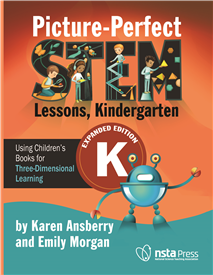All Resources
Journal Article
Computing in Bioinformatics and Engaged Student Learning
The field of biology education—and other science, technology, engineering, and mathematics (STEM) disciplines more broadly—has witnessed two major shifts in the past decade: (i) the increased awareness of research-based instructional strategies (...
By Tina A. Marcroft, Chris Rasmussen, and Scott T. Kelley
Journal Article
Connecting pH and Molarity to Health Care
Given the recent state of social distancing, the online lab experience discussed in this article offers an economical and versatile approach to online undergraduate chemistry lab instruction. With videoconferencing software, this experience is easily...
By Angela L. Mahaffey
Journal Article
Intentionally Addressing Equity in the Classroom
Equity, as we define it, means striving to serve the needs of others and enhancing belonging by focusing on “whole humans” in emotional, sociocultural, and personal contexts. Integrating equitable practices in STEM classrooms has advantages rangi...
By Jessica Kansman*, Makenzie E. Mabry*, Aaron Morrison*, Stephanie Rosbach*, and Marcelle A. Siegel
Journal Article
STEM Graduate Students’ Development at the Intersection of Research, Leadership, and Innovation
Researcher innovation and leadership skills are fundamental for creating implementable solutions to pressing societal and market-based global problems. The Research to Innovation to Society (R2I2S) program is a transformative approach to graduate edu...
By Cindy Lenhart, Jana Bouwma-Gearhart, Douglas A. Keszler, Judith Giordan, Rich Carter, and Michelle Dolgos
Journal Article
Physical and life science disciplines emphasize how basic structural units influence function, yet it is challenging for students to understand structure-function relationships, particularly at molecular scales. Undergraduates in our biology capstone...
By Robin Forbes-Lorman, Michele Korb, Amy Moser, Margaret A. Franzen, and Michelle A. Harris
Journal Article
There and Back: How a Global Pandemic Shaped Youth Programming
By Marti Lindsey, Ben Richmond, Alex Benavides, Graciela "Zonnie" Olivas, Kelle Hyland, Leesa Lyons, Lexy Havunen, Mayra Vargas, Brook Moreno, and Bob Mittan
Journal Article
Fingerprint Spoofing: Exploring Cybersecurity With Limited Technology
By Patrick Burton, Kristin Cook, Rob Kelley, Jessica Ivy, and Kevin Thomas
Journal Article
The Constructivist Flipped Classroom
In science education, the value of the constructivist methodology has long been integrated with experiential and hands-on learning while offering a framework for teaching and learning. In recent pre- and future postpandemic times, as various online m...
By William H. Robertson
Journal Article
Historically, undergraduate anatomy and physiology (A&P) has been a challenging course for incorporating conceptual learning techniques due to large class sizes and an emphasis on content and terminology. The project utilized the Predict-Observe-...
By Sammi Moore, Ron Gray, and Jeff Meilander
Journal Article
Student Acceptance of Evolution
Acceptance of human evolution seems to be the majority position for the U.S. population; however, acceptance of evolution among conservative Christian groups is low, sometimes below 50%. There are many different reasons for this low acceptance, leadi...
By Daniel G. Ferguson, Jamie L. Jensen, Adhieu Arok, Seth M. Bybee, and T. Heath Ogden
Journal Article
Students as Science Content Creators and Evaluators
Within the context of higher education, the disciplines of science and filmmaking appear disparate, but the importance of storytelling as an integral part of science and research deserves closer examination. Humans have always used stories to share i...
By Erica B. Walker and Kelly B. Lazar
Journal
Science and Children—September/October 2022
Volume 60, Number 1 Joyful Science This school year, let’s find ways to make learning joyful. When I think of joyful learning, I do not think only about the development of lifelong learners ready to ask questions, who actively dive into an ...
Web Seminar
This interactive web seminar will begin with an overview of safety protocols specific for doing secondary level safer science/STEM laboratory activities with Dr. Ken Roy, NSTA and NSELA Safety Compliance Advisor/specialist and Dr. Kevin Doyle of Morr...
Web Seminar
This interactive web seminar will begin with an overview of safety protocols specific for doing elementary level safer science/STEM classroom/laboratory activities with Dr. Ken Roy, NSTA and NSELA Safety Compliance Advisor/specialist and, Director of...
Web Seminar
Archive: Science Update: State of the Climate 2022, January 19, 2023
The past several years have seen too many weather and climate extremes to count, from record-obliterating heat waves to tremendous rainfall events to terrifyingly strong tropical cyclones. What can scientists say about how weather and climate extreme...
Class Pack
Now Available for Grade K-2 Picture Perfect STEM Lessons - Ready-to-TeachTM Picture-Perfect ClassPacks! • We are excited to announce our new kitting partner: ECA Science Kit Services! Now offering ...
Class Pack
Now Available for Grade K-2 Picture Perfect STEM Lessons - Ready-to-TeachTM Picture-Perfect ClassPacks! • We are excited to announce our new kitting partner: ECA Science Kit Services! Now offering ...
Class Pack
Now Available for Grade K-2 Picture Perfect STEM Lessons - Ready-to-TeachTM Picture-Perfect ClassPacks! • We are excited to announce our new kitting partner: ECA Science Kit Services! Now offering ...
Class Pack
Now Available for Grade K-2 Picture Perfect STEM Lessons - Ready-to-TeachTM Picture-Perfect ClassPacks! • We are excited to announce our new kitting partner: ECA Science Kit Services! Now offering ...
Lesson Plan
Lesson Plan
Lesson Plan
Journal Article
Connect Students With Outdoor STEM Learning Opportunities Alongside Science Professionals
By Megan Willig
Journal Article
Learning About Coastal Zone Plants—Integrating Formal and Informal Teaching and Learning Practices
By M. Alexandra Abreu Lima and Lia Vasconcelos
Journal Article
A Teamwork-Based Technique Using Agricultural Fields to Measure the Speed of Sound
By Gordon H. Miller and Helen Belefant-Miller
Web Seminar
Students’ Ideas Matter! Linking Formative Assessment Probes to Instructional Sequence teaching is all about creating conceptual coherence for learners to better prepare them for future careers....
Web Seminar
Education research, policy, and practice with minoritized student groups were traditionally framed in terms of what the students were lacking and how to fix this problem (a deficit-oriented view). In recent years, there have been growing efforts to l...
Web Seminar
Education research, policy, and practice with minoritized student groups were traditionally framed in terms of what the students were lacking and how to fix this problem (a deficit-oriented view). In recent years, there have been growing efforts to l...
Web Seminar
High-quality instructional materials (HQIM) designed for next generation science can make a difference in the quality of equitable science teaching and learning throughout the educational system and for all learners (i.e., for all leaders, teachers, ...
eBook
There’s a lot to love about this newly expanded book in the Picture-Perfect Science series: You can combine STEM and reading through lively lessons that are just right for your kindergarten students. Also, reading-comprehension strategies are embed...
Lesson Plan
Lesson Plan





